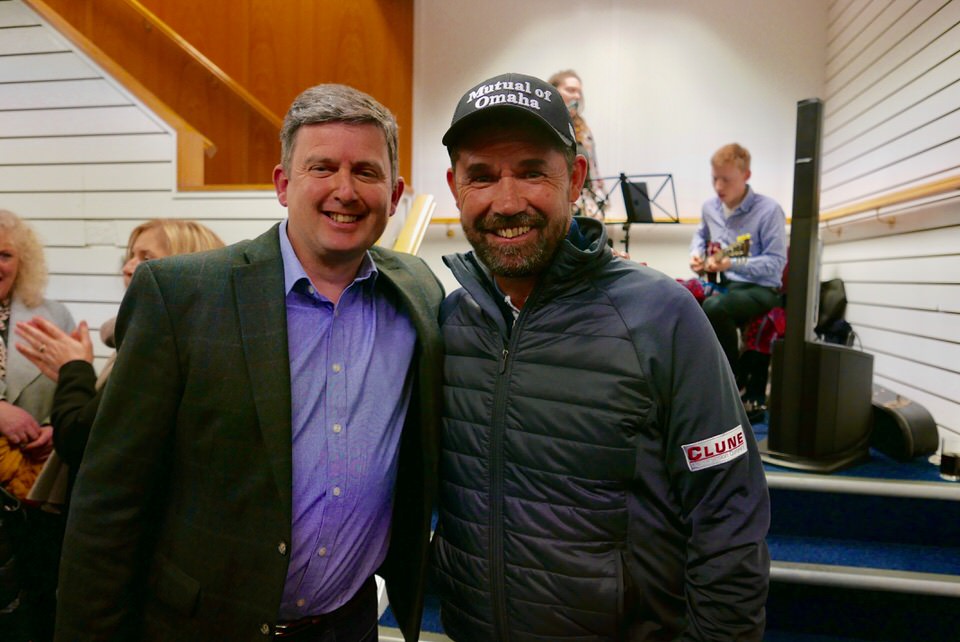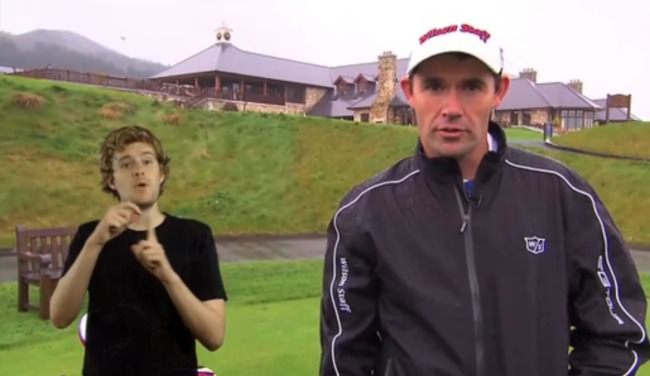Harrington on referees, Renwick and the rules: "Once a caddie sees something, he can’t unsee it"

Padraig Harrington and referee Andy McFee following his disqualification in Abu Dhabi in 2011. Picture: Eoin Clarke/www.golffile.ie
Tiger Woods and Rory McIlroy have had their share of rules mishaps in the Gulf over the past 12 months. But for Pádraig Harrington, a man whose disqualification on slo-mo evidence in Abu Dhabi in 2011 led to a change in Decision 33-7/4.5, the laws of the game are still “pretty good.”
“What else would an R&A ambassador say!” I hear your say. And yet Harrington has more reason than most to rail against seemingly arcane, nitpicky rules and the harsh disqualifications or penalties handed out to players who sought no advantage
After all, the three-time major winner was disqualified before the final round of the Benson and Hedges International Open in 2000 - when leading by five strokes - when it was discovered that he’d failed to sign his first round scorecard.
“In hindsight it [Benson and Hedges] is not a bit painful, but it's an interesting story,” he said with a chuckle after a visit to his home club of Stackstown earlier that day led him to peek at his collection of mementos in the club’s dedicated ‘Harrington Room’.
“I was looking at all the memorabilia in that room today and the thing that got the most attention was those scorecards [from the Benson and Hedges].”
Whatever about McIlroy's two-stroke penalty in the Abu Dhabi HSBC Golf Championship, Harrington has interesting views on the rules and whether players rely too much on referees.
“On the night in question [in Abu Dhabi] there was a player barbecue and myself and two other players were discussing the rules,” he said. “I’m not sure if it was because of that [Rory’s] incident. But anyway, we ended up discussing the rules and players calling the referee for simple things that they shouldn’t need the referee for.
"And so somebody made the comment that you wouldn’t need to do that for a TIO [Temporary Immovable Obstruction]. And between the three players, we all had a different interpretation of what to do in said situation.
“So, the rules are not clear cut all the time and yet there is a encouragement that we should be able to operate most of the time without a referee. So, under that circumstance, if Rory was to call a referee, most players would consider that a waste of the referee’s time. But unfortunately, if you have a referee, you can’t make a mistake.”
Rory McIlroy plays the shot that cost him a two shot penalty in Abu Dhabi.
The R&A is working to simplify the rules of golf. But as Harrington knows, the "Decisions on the Rules of Golf" is now a 600-page tome that’s not going to get slimmer any time soon.
“Even when you know the rule, you can still make mistakes,” he said. “There is a pressure on players to function without a referee, just like amateurs don’t have access to referees and have to continue on. By being diligent in that sense you are going to leave yourself open to the odd mistake.
“So you are more likely to call the referee when you are competing to win, when you are more likely to make a mistake that would be costly at that stage. When you are in the middle of the field, you are more capable of operating on your own and clearly if you make a mistake it wouldn’t be as costly. I have seen players call a referee to take a drop out of a hazard when they are leading a tournament. They wouldn't do it if they were 50th in the event.
“Rory was trying to function there the proper way that professional golf should function. You don’t need the referee every time. The worst thing I have done was give a guy a ruling that cost him an extra shot. I jumped in, told him what he needed to do and as it turned out, I was wrong. Instead of being a one-shot penalty, it was a two-shot penalty because of what I said."
The average golfer has a very basic grasp of the rules, which is partly to blame for the general outcry against seemingly bizarre penalties being incurred by tournament professionals.
"The rules themselves are simple, it is the interpretation of the rules that has become very long," Harrington said.
“Knowing the rules does help you though. Many a time I have lived and died by knowing the rules. They have penalised me because I know them and at other times they have saved me shots.
Pádraig Harringtons Benson & Hedges scorecard. It was signed by Jamie Spence and Michael Campbell but not by Harrington himself. Picture via scottishgolfmuseum.co.uk
“The average player playing socially isn’t interested in that side of things. I think the rules are pretty good to be honest. Once you understand them, once you understand how each rule has evolved and why it is there, and the different interpretations of those rules, they are not so complicated - once you delve into them."
As for caddie Dave Renwick’s decision to point out McIlroy’s innocent mistake in Abu Dhabi, Harrington sees no problem with the veteran caddie's actions. Quite the contrary.
“Dave Renwick spoke very well afterwards. He is very experienced and he is long enough in the tooth not to be worried about what other people think or say. A younger caddie definitely might have been concerned to enquire more. Once a caddie sees something, he can’t unsee it. He can’t close his eyes. He can't forget it. There was no advantage gained but you have to point it out.”






